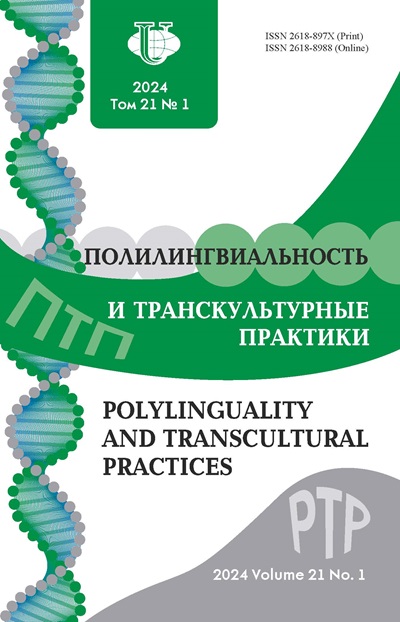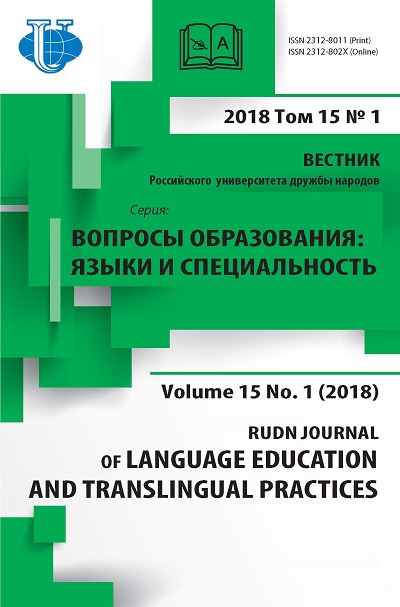Linguo-Didactic Opportunities for Using Associative Rows in the Practice of Teaching Russian as a Foreign Language
- Authors: Osmanzade A.O.1
-
Affiliations:
- Azerbaijan University of Construction and Architecture
- Issue: Vol 15, No 1 (2018)
- Pages: 18-26
- Section: ARSENAL
- URL: https://journals.rudn.ru/polylinguality/article/view/18099
- DOI: https://doi.org/10.22363/2312-8011-2018-15-1-18-26
Cite item
Full Text
Abstract
This article presents the latest approaches to the study of the Russian as a foreign language, including cultural studies in linguistics and methods of psycholinguistics. The material of the associative experiment, conducted with 50 recipients of different age groups, presents the results of reactions to the word-stimulus “war” in Russian, Azerbaijani and English. Our comparative analysis of the content of the presented concepts has shown that in different linguistic pictures of the world they are filled with various connotations. These conclusions can have value in the process of intercultural cooperation.
About the authors
Alima Osmanovna Osmanzade
Azerbaijan University of Construction and Architecture
Author for correspondence.
Email: a.osmanzade@gmail.com
Doctor of Pedagogical Sciences, Professor at the Department of Foreign Languages
5, Aina Sultanov str., Baku, 370073, Azerbaijan RepublicReferences
- Kurganova, N.I. 2011. Modelirovanie kognitivnyh operacij na baze associativnyh polej [Modeling of Cognitive Operations on the Basis of Associative Fields] in «Jazykovoe bytie cheloveka i jetnosa: kognitivnyj i psihologicheskij aspekty». Moscow. S. 123—126. Print. (in Russ.)
- Leontovich, O.A. 2007 Vvedenie v mezhkul’turnuju kommunikaciju [Introduction to Intercultural Communication]. Uch. posobie Moscow. Print. (in Russ.)
- Troshina, N.N. 2011. Lingvokul’turologija i antropocentricheskaja paradigma [Cultulal Studies in Linguistics and Anthropocentric Paradigm] in «Jazykovoe bytie cheloveka i jetnosa: kognitivnyj i psihologicheskij aspekty». Moscow. S. 226—229. Print. (in Russ.)
- Rogova, A.V. 2012. Strategii i taktiki mezhkul’turnoj lingvodidaktiki kak innovacionnoj osnovy obuchenija russkomu jazyku [Strategies and Tactics of Intercultural Linguodidactics as an Innovative Basis for Teaching the Russian Language]. PhD Dis. Moscow: RUDN. Print. (in Russ.)
- Pilipchuk, S.V. 2011. Jazykovaja lichnost’ v mezhkul’turnom obshhenii [Language Personality in Intercultural Communication] in «Jazykovoe bytie cheloveka i jetnosa: kognitivnyj i psihologicheskij aspekty». Moscow. Print. (in Russ,)
- Lihachjov, D.S. 1997. Ob intelligencii [About the Intelligentsia]. Sb. statej. St. Petersburg. Print. (in Russ.)
- Malinovich, Ju.M., and M.V. Malinovich. 2003. Antropologicheskaja lingvistika kak integral’naja nauka [Anthropocentric Linguistics as an Integral Science] in Antropologicheskaja lingvistika: Koncepty. Kategorii. Moscow-Irkutsk. Print. (in Russ.)
- Stepanov, Ju.S.1997. Konstanty [Constants]. Slovar’ russkoj kul’tury. Moscow. Print. (in Russ.)
- Zalevskaja, A.A. 2000. Nacional’no-kul’turnaja specifika kartiny mira i razlichnye podhody k ejo issledovaniju [National and Cultural Specifics of the Picture of the World and Various Approaches to its Study] in Jazykovoe soznanie i obraz mira. Moscow. Print. (in Russ.)
- Morel’, D.A. 2012. Kompleksnoe ispol’zovanie dannyh associativnogo jeksperimenta v issledovanii fragmentov jazykovoj karty mira [Complex Use of Data from the Associative Experiment in the Study of Fragments of the Language Picture of the World]. Filologicheskie nauki. Voprosy teorii i praktiki 7: 134—144.
- Telija, V.N. 1995. O metodologicheskih osnovah lingvokul’turologii [On the Methodological Foundations of Cultural Studies in Language] in Logika, Metodologija, Filosofija nauki. Tezisy dokladov. Moscow-Obninsk. Print. (in Russ.)















